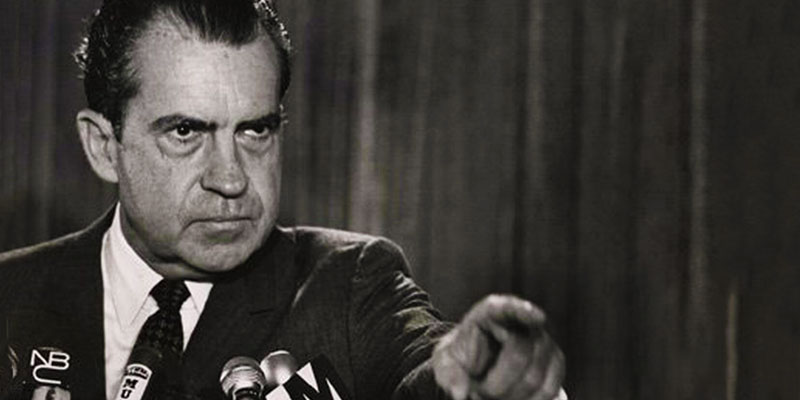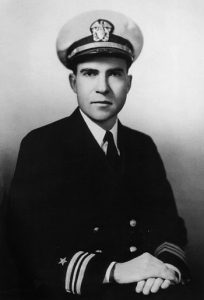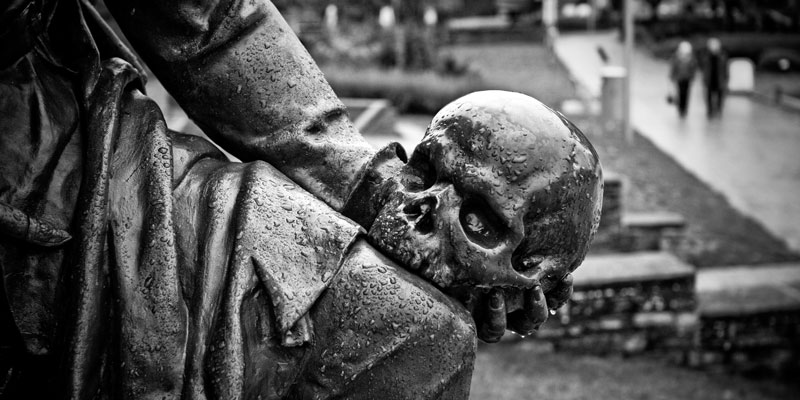Lost (Poker) Face at Watergate — Still a Gambling Man?

Having a poker face and being a president are certainly words which have been found in the same sentence before. Many former U.S. presidents have been fans and avid players of the game — Lincoln, Roosevelt, and Eisenhower included. Now, Richard Nixon did more than just play the game. By playing poker, Richard Nixon was able to partially fund his congressional campaign in 1946.
When serving as a lieutenant in the Navy in the 2nd World War, Nixon was in his early 30s. This was not an easy post, especially while he was stationed in the Solomon Islands. The steady stream of Japanese air bombings left little leisure time, to say the least.
But after some time, Nixon was transferred to Green Island, a base that wasn’t under attack nearly as much. In those long hours between contemplating life, having nothing to do after duties, and waiting for the enemy to strike, the officers found a way to occupy themselves.
They played poker.
And, apparently, some played better than others. Richard Nixon came back from the war much richer than he’d gone to, thanks to the poker winnings he’d amassed.
The Diligent Student
 When you think of a young man with a pious Quaker background joining the Navy (though his religion was an excuse in itself), you might raise an eyebrow. This might have been purely patriotic on his part, but gambling and playing poker really couldn’t have sat right with the community. The combination of the wartime pressure along with the mind-numbing monotony made poker seem appealing to anyone, Quaker or otherwise. But Nixon didn’t play just to distract himself from the dull day or the horror of his predicament. He was good. Really good. A fellow Navy man even said in an interview that he’d never seen Nixon lose.
When you think of a young man with a pious Quaker background joining the Navy (though his religion was an excuse in itself), you might raise an eyebrow. This might have been purely patriotic on his part, but gambling and playing poker really couldn’t have sat right with the community. The combination of the wartime pressure along with the mind-numbing monotony made poker seem appealing to anyone, Quaker or otherwise. But Nixon didn’t play just to distract himself from the dull day or the horror of his predicament. He was good. Really good. A fellow Navy man even said in an interview that he’d never seen Nixon lose.
Nixon hadn’t gone to the Navy knowing how to play poker. He would watch and learn, memorizing and assessing each game. He talked to several players and fellow officers, with officer Stweart being his main consultation man. Stewart taught Nixon to approach the game with patience, diligence and discipline, and to play conservatively. This meant turning in the cards about 4 out of 5 times on average and going all in only when you know you have the best hand. Bluff rarely, make it count.
Nixon watched the other players like a hawk, trying to gage how they behaved when they had a good hand, and how and if they bluffed. He would also only go in with his money if he was sure the other person had a losing hand. At first, Nixon would practice with the best players around, playing some no-stakes games as practice. When he felt he’d honed his skills, Nixon started playing for real. His poker variation of choice was “five–ten,” a five-card stud game; so you were allowed two $5 raises with a $10 cap on the third bet. The pots ran from $10 to $50.Nixon was in it for the long haul, preferring to incrementally bank $20-$30 per night and end up with about $150 per month, which is about $2,000 today. He made it his business to keep his winnings consistent. Needless to point out, this was quite a boost to his Navy ensign salary.
What a Poker Face
Nixon seemed to be on a mission — to bulk up his piggy bank if nothing else. Some wondered if he got any actual pleasure from the game, but Nixon himself clarified that in an interview — he said he enjoyed the entertainment value, as well as the profit. He was certainly proud of himself when winning. Once, he got a royal flush and managed to contain his excitement. He calculated it was 650,000 to 1 shot. Putting his best Poker Face forward, he put in the money.
Another factor that contributed to him winning was finding the others’ psychological weaknesses and then using those against them. Nixon wrote that he found the loudest, most boisterous were just hiding a bluff, and the quiet ones were to be on the lookout for.
He was so immersed and disciplined in his gameplay that he didn’t take the opportunity to meet legendary Charles Lindbergh! The aviator was visiting the base on Green Island, but Nixon was busy hosting a poker game. Despite such an investment, Nixon stopped playing poker when the war ended.
Poker and Politics Like Peas in a Pod
That whole phase in his life must’ve come in handy as a sort of diplomatic training. He was even asked in an interview if it took a great poker player to make a great president. Nixon answered, “It helps.” Having some poker knowledge can be very useful in politics and foreign affairs, Nixon insisted. He pointed out that American leaders should stop putting all their cards on the table and remain unpredictable. He also suggested his local government might benefit to use the fine art of bluffing.
It was about being unpredictable as a leader, he said, because that was the greatest asset one had — in poker and politics. When asked about Russia, he pointed out they played chess, and America played poker. Apparently, it’s apples and oranges.
“I am not a crook.”
Some say these famous words originated from the time he won money from poker. Others just wish they were merely poker-related.
When he came home from the war, Nixon brought home a stack of cash. Most estimates make it around $7,000 then, which is roughly just over $100,000 in today’s money. The original idea was to add that up with Pat’s money and buy themselves a house. Instead, businessman Herman Perry wrote Nixon that he’d have a good chance to win a congressional seat in California. Nixon put the poker money towards the campaign, and it is estimated that it made up 20% of the total funds. He made an easy victory again his main opponent in 1946.
Though Nixon didn’t play poker anymore, he did use some poker metaphors during the Watergate scandal. On one occasion, Nixon berated the FBI director at the time for being too cocky in a congressional hearing. He told him that a good poker player would never boast, whether he had good cards or not.
Nixon also stated once that he had every faith that Khrushchev would have made an amazing poker player. Khrushchev overestimated his hand, and so did Nixon. The term Watergate has now come to encompass various clandestine and illegal activities and cover-ups from his time in office.


